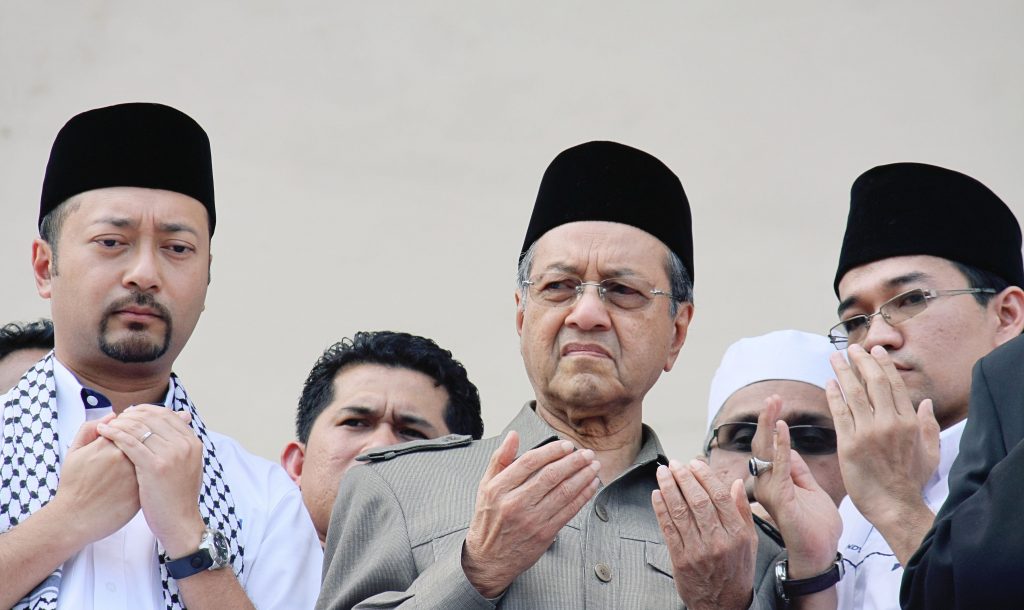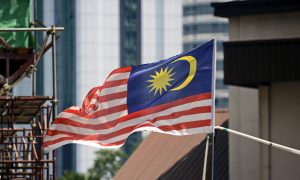The United Malays National Organisation (UMNO) secured a landslide victory in a by-election held on 29 August for the Slim state constituency, where it won 84.5 percent of votes against the newly-established Parti Pejuang Tanah Air (Pejuang) led by former prime minister Mahathir Mohamad. Slim is a rural constituency in Southern Perak where ethnic Malays comprise three-quarters of the electorate. Oil palm and other agricultural activities constitute the main sources of income, while state-led agricultural initiatives have traditionally played a crucial role in uplifting the area’s economic fortunes. Given the common perception that Mahathir retains significant traction among rural Malays, the by-election result may have come as a surprise, with Pejuang expected to reap a higher vote share. However, deeper analysis reveals that the by-election result is less surprising that it may at first seem.
As Mahathir’s Pejuang remains unregistered, its candidate in the recent by-election, Amir Khusyairi, contested as an independent. Pejuang is an independent Malay-based party not aligned to the opposition Pakatan Harapan (PH) coalition. It seeks to be a kingmaker in the next general election. But despite Mahathir’s repeated campaigns in Slim on an anti-corruption platform, Amir barely attained the one-eighth vote share threshold required to retain his election deposit.
UMNO has represented the Barisan Nasional (BN) coalition in Slim ever since the constituency was established. As a beneficiary of rural developmental schemes, Slim was historically a stronghold for UMNO until recent years. Prior to the 2018 General Election (GE2018), UMNO always garnered at least 60 per cent of the vote share.
In the 2018 General Election (GE2018), UMNO retained the Slim seat in a three-corner fight against the Malaysian Islamic Party (PAS) and the Malaysian United Indigenous Party (Bersatu). Bersatu was then part of the opposition Pakatan Harapan (PH) coalition, and represented PH in Slim. The Slim by-election reflects the fluidity of Malaysian politics since GE2018, with UMNO, PAS and Bersatu—all Malay-based parties—forming the present Perikatan Nasional (PN) federal government. Prime Minister Muhyiddin Yassin comes from Bersatu and concurrently serves as the party’s president. Despite Mahathir’s attempts to regain control of Bersatu in the aftermath of February’s “Sheraton Move” which saw the ousting of the PH government, Bersatu has remained loyal to Muhyiddin, with Mahathir unceremoniously sacked and stripped of his chairman position.
GE2018 signalled a national watershed for UMNO, with Mahathir’s alliance with PH widely credited as the catalyst for the opposition coalition to achieve a breakthrough in rural Malay constituencies. Mahathir was the country’s longest serving prime minister, and during his two decades in office actively championed affirmative policies to empower ethnic Malays and Bumiputra (indigenous peoples). In GE2018, UMNO lost its absolute majority in Slim for the first time but the late Mohd Khusairi Abdul Talib (who passed away on 15 July, triggering the by-election) retained the seat due to the three-corner fight.
A close analysis of the GE2018 results and polling district data suggest that, at least in Slim, the supposed “Mahathir effect” was nuanced and not straightforward though. Malaysians vote according to polling districts (Pusat Daerah Mengundi in Bahasa Malaysia), and Slim for instance contains 13 polling districts. Considering that 6 of the 13 polling districts in Slim comprise ethnic Malays almost exclusively, an analysis of polling district results provides granular and valuable insights on the “Mahathir effect” for both GE2018 and the recent by-election.
UMNO garnered an average vote share of 51.7 percent among the six Malay-dominated polling districts in GE2018, its worst record compared to preceding elections. At the same time though, Bersatu (PH) received just under one-fifth of total votes in the six-Malay dominated polling districts in GE2018.
Compared to Bersatu (PH), in Slim, PAS was perceived as the more favourable option among the Malay electorate dissatisfied with the then ruling BN government. Two-thirds of the Malay voters who did not support UMNO threw their weight behind PAS. Mahathir’s alliance with the opposition PH coalition during GE2018 may have somewhat discredited UMNO’s credibility among ethnic Malays (at least in Slim), but the latter remained generally cautious to throw their support behind Bersatu (PH). Bersatu (PH) performed significantly better in the remaining seven polling districts which have a higher percentage of non-Malay voters.
Mahathir faced an even steeper uphill battle during the recent by-election, as the newly established Pejuang did not have sufficient time to develop a grassroots machinery in Slim. In addition, given that both the state and federal government are helmed by PN, Mohd Zaidi from UMNO was able to campaign on developmental politics by promising to resolve the long-standing flooding in Slim should his party be re-elected.
Compared to GE2018, Mahathir may have lost some of his traction among rural Malays as the reduction in subsidies for low-income households during his premiership has disproportionally impacted rural residents. Cost of living remains an unresolved and persistent concern for residents in rural constituencies, including Slim. Despite the PH government fulfilling its election manifesto to withdraw the 6 percent Goods and Service Tax soon after GE2018, prices of goods have not fallen significantly across the country.
PAS supporters in GE2018 would have likely migrated their votes to UMNO during the recent by-election, given that PAS has allied with UMNO under Muafakat Nasional since September 2019, with both parties part of the ruling PN government. As seen from the by-election polling districts results, Amir obtained just under 10 percent of the overall vote share in the six Malay-dominated polling districts—a ten per cent drop compared to GE2018. Mahathir and Pejuang may have performed poorly in the recent Slim by-election, but a comparison with GE2018 suggests that the result is less surprising that it may first seem to be.
 Facebook
Facebook  Twitter
Twitter  Soundcloud
Soundcloud  Youtube
Youtube  Rss
Rss 


